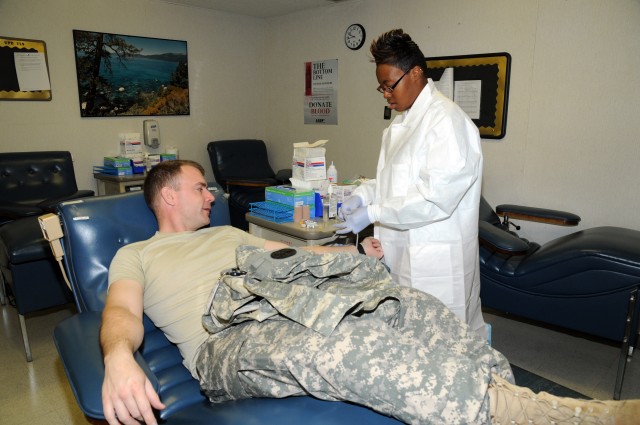FORT BRAGG. N.C. - January is National Blood Donor Month, but that really doesn't change the mission of the Fort Bragg Blood Donor Center. Rain or shine, peacetime or wartime - the center must still collect whole blood and platelets to help care for servicemembers and their Families.
The Fort Bragg Blood Donor Center is part of the Armed Services Blood Program.
The blood collected at the Fort Bragg location and the other 19 centers across the country and around the world is sent to a centralized location. From there, the ASBP determines where the blood is needed most and ensures it gets there.
The blood donated at the Fort Bragg Donor Center could go many places. The primary mission of the center is to supply blood to the Soldiers deployed overseas through the ASBP central processing location at McGuire Air Force Base, N.J. Surgical teams from the 82nd Airborne Division and Joint Special Operations Command deploying overseas also receive their blood supply directly from the donor center, helping them to save the lives of the Soldiers they operate on or a member of their team.
Womack Army Medical Center receives some of its blood supply from the Fort Bragg Center, as does the hospital in Fort Knox, Ky. Fort Bragg also helps supply Walter Reed Army Medical Center and regional veterans' hospitals as needed. The ASBP is also helping support the humanitarian mission in Haiti by supplying Navy ships assisting with relief efforts with red cells and blood product.
To accommodate such a large need, Fort Bragg has a weekly quota that it must fulfill. Meeting the weekly quota for blood collection may seem like an easy task for such a large installation, but with many of Fort Bragg's Soldiers deployed, deploying or just returning from a deployment, the number of eligible donors is lower than might be expected.
"Generally, any person who is 17 or older and healthy is eligible to donate blood," said Capt. Aleksey Casco, chief of blood services at the Fort Bragg Blood Donor Center. "It's primarily the travel restrictions that hit us hardest. Soldiers who deployed to Iraq and Afghanistan have to wait a year after their return to be eligible to donate blood. This greatly reduces the number of qualified donors in our population."
Another difficulty the center faces in donor recruitment is the continuing restriction on donors who lived in the United Kingdom for more than three months between 1980 and 1996 or more than six months in Europe from 1980 to 1996.
According to the ASBP Web site, the Centers for Disease Control and Prevention, along with the Food and Drug Administration, review this policy every six months to see if new evidence or technology will allow them remove this restriction.
The Fort Bragg Donor Center accepts and processes whole blood and platelet donations. The difference between donating the two is how long the process takes, where the product goes, what it's used for and how often you can donate.
Whole blood donors can donate every two months. Because whole blood is only good for 42 days, speed is of the essence when processing and shipping blood products. Blood is shipped to the ASBP central processing location within four days.
"You are able to almost immediately save a life when you donate blood," said Linda Ellerbe, ASBP recruiter. "The blood you donate on Monday is in the desert saving a Soldier within the same week."
The entire blood donation process takes less than an hour, said Ellerbe. This includes the registration, donation and short recovery time with refreshments.
Platelet donations stay local because the product expires in five days. The process takes about an hour and a half and active-duty donors can receive promotion points in addition to helping out someone who needs platelets. The recovery period time between donations is shorter, allowing platelet donors to give every two weeks.
Platelet donation is important because the platelets help control bleeding and are primarily used for cancer patients undergoing chemotherapy.
Whether a donor chooses to donate whole blood or platelets, the Fort Bragg Donor Center welcomes donors of all blood types, it's not just about finding those who are universal donors.
"All blood types are in demand," said Casco. "We need donations from everyone for everyone. Of course, we always welcome universal donors, which are the rarest blood types."
Casco said that those with type O blood are universal whole blood donors and type AB is the universal donor for plasma. Both Casco and Ellerbe stressed how important it is to donate if you can because the Army has to fulfill its blood requirements from its own resources.
"The process is easy, safe and incredibly important," she said. "Our donors are one of Fort Bragg's most valuable resources."
The Fort Bragg Blood Donor Center is located in Building 8-2807 on Scott St. They are open Monday to Friday, from 7:30 a.m. to 4 p.m.
The center is also able to schedule mobile blood drives for those who want to sponsor them. The drive must be on federal property and be conducted in a suitable collection facility that meets FDA regulations.
There will be a blood drive on Pope Air Force Base at the fitness center Monday from 7:30 a.m. to 3 p.m. On Feb. 12, Soldiers' Angels will be sponsoring a blood drive at Womack Army Medical Center from 7 a.m. to 4 p.m.
For information on the ASBP or to schedule an appointment, call 396-9925 or visit www.militaryblood.dod.mil/fortbragg. Walk-ins are always welcome.


Social Sharing